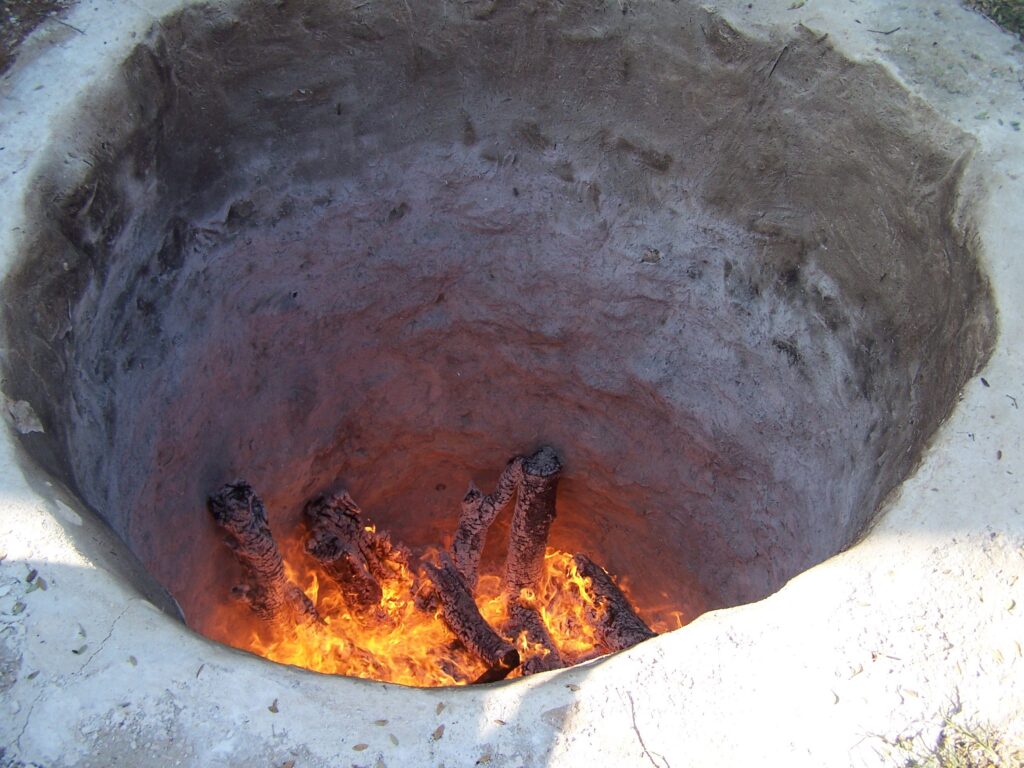How to cite this article: Weston W. Fields, “Salted with Fire,” Jerusalem Perspective 9 (1988): 1-2 [https://www.jerusalemperspective.com/2192/].
Among the difficult sayings of Jesus, Mark 9:49 is one of the most enigmatic: Πᾶς γὰρ πυρὶ ἁλισθήσεται (pas gar pū⋅RI ha⋅lis⋅THĒ⋅se⋅tai, “Everyone will be salted with fire”). What Jesus meant by this strange mixture of “salt” and “fire” has perplexed Greek scholars for a very long time.
Many Interpretations
At least fifteen different explanations for this verse have been offered. Most scholars connect salt and fire with purification because these were both used in the temple sacrifices.
According to the Mishnah, the temple priests put salt into the carcass of a bird that had been slaughtered for a whole burnt offering, to draw out the blood:
He [the priest] would wring off its head…slit open the body…soak up [the excess blood on the inside of the body] with salt and throw it on the altar fire. (m. Zevahim 6:5)
The interpretation that the salt and fire have something to do with purification or dedication is evident in many translations, for example Today’s English Version: “Everyone will be purified by fire as a sacrifice is purified by salt.”

Hebrew Idiom
Almost all previous explanations of this verse have dealt with the Greek text, but like many of the difficult sayings of Jesus, this one simply cannot be explained from the Greek alone. “Salted with fire” is one of the puzzling statements of Jesus that are unlocked when translated back into Hebrew.
A number of scholars today consider Hebrew to be the most likely language of the earliest written accounts of Jesus’ life. This theory seems to be confirmed in another, unexpected way. Mark 9:49 is one of the many passages in Mark that may be translated word for word into Hebrew without changing the word order: כָּל אִישׁ בָּאֵשׁ יֻמְלַח (kol ’ish bā⋅’ĒSH yum⋅LAḤ; Every man with fire will be salted).[1]
I suggest that a Hebrew idiom was translated literally, not dynamically, into Greek. As those who could recognize the Hebrew idiom behind the statement became fewer, its original meaning may have become lost. The range of meaning of the word “salt” in Hebrew[2] can give us a clue to the meaning of “salted with fire.”
Uses of Salt
The root מלח (m-l-ḥ, to salt) is used in the Hebrew Scriptures not only in contexts where it means “purification, reservation,” but also in contexts were it is a symbol of barrenness and destruction.
Alcalay’s The Complete Hebrew-English Dictionary translates the expression זָרַע מָקוֹם מֶלַח (zā⋅RA‘ mā⋅KŌM ME⋅laḥ; literally, “to sow a place with salt”) as “to destroy completely.” Such an action is described in Judges 9:45, where Abimelech destroys Shechem. Part of the destruction was sowing salt in the city.
The case of Lot’s wife, who was destroyed when she disobeyed God’s command and was turned into a “pillar of salt,” is well known. It is probably as an allusion to this familiar incident that Isaiah 51:6 uses the root מלח (m-l-ḥ) in the sense of “destroy.”
A New Translation
I propose a new translation of the verse, based on the retroversion to Hebrew. In the verses preceding verse 49 (Mark 9:42-48), Mark records that Jesus warned those offending “these little ones,” and declared that one would be better off to rid himself of offending parts of his body than to be cast into hell, where the fire never goes out and “their worm does not die.” It would fit this context to translate verse 49, “Everyone [who is cast into hell] will be completely destroyed,” that is, destroyed by fire.
The Hebrew expression, literally translated in Mark’s Greek source, would have been understood figuratively by its first readers. But once the gospel left the world of Palestinian Judaism and its Hebrew-speaking constituency, the meaning of the phrase could have easily been forgotten.
It is interesting to note that several centuries ago two Dutch exegetes, Hugo Grotius in 1641 and Johannes Clericus in 1714, proposed this very interpretation. These interpreters provide independent confirmation of the plausibility of the meaning of “salted with fire” suggested in this article.
For reflections on “Salted with Fire” by Weston Fields, see “Engaged: Eternally Dwelling In Hell?” by Brian Becker—JP.

- [1] See Robert Lindsey, A Hebrew Translation of the Gospel of Mark (2nd ed., 1973), 125. ↩
- [2] Since Aramaic also has the root מלח (m-l-ḥ), if one prefers to posit an Aramaic rather than a Hebrew original for the sources behind the Greek Synoptics, the interpretation suggested here would probably still be valid. ↩




Comments 2
JP is mourning the loss of Weston Fields, who died this past month (May, 2023). Among his many accomplishments, Weston helped raise the funds to publish the scholarly editions of the Dead Sea Scrolls after decades of delay. A personal friend and member of the Jerusalem School of Synoptic Research, Weston was also a contributor to Jerusalem Perspective magazine. In addition to “Salted with Fire,” JP readers might enjoy Weston’s book, The Dead Sea Scrolls: A Full History (Brill [free PDF download]).
Glad you highlighted this article from so many years ago. The paragraph on the uses of salt is especially interesting. I will be studying through scripture to check for other references as I have tended to always think of salt as an essential flavouring rather than also as a symbol of destruction. I would be interested to hear from other readers.